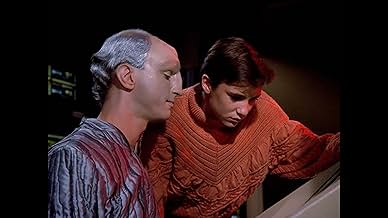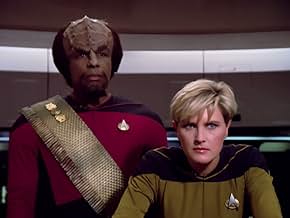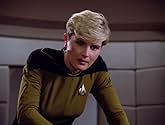Everyone accurately pegs a visiting propulsion scientist as a charlatan, but only Wesley Crusher recognizes his alien assistant as the real deal.Everyone accurately pegs a visiting propulsion scientist as a charlatan, but only Wesley Crusher recognizes his alien assistant as the real deal.Everyone accurately pegs a visiting propulsion scientist as a charlatan, but only Wesley Crusher recognizes his alien assistant as the real deal.
James G. Becker
- Youngblood
- (uncredited)
Byron Berline
- Officer playing Violin
- (uncredited)
Darrell Burris
- Operations Officer
- (uncredited)
Featured reviews
Fans and critics agree that the first and second seasons of ST:TNG were not the greatest, and although one could say confidently that the first few episodes were fun, they weren't particularly noteworthy.
This all changed with episode 5, Where No One Has Gone Before. S1 harkened back to TOS with The Naked Now, and this episode as well references the second pilot of TOS - Where No Man Has Gone Before - with more than just a nod to the episode title. In the original Gary Mitchell was given the power to make thoughts a reality, and this episode includes a similar theme.
This episode is extremely important for a couple of reasons, but the primary reason is that the enormous potential for the series was shown brilliantly with this episode. During the first season TNG was attempting to find its way with with varying results. Where No One Has Gone Before was big jump in storytelling, infusing a philosophical thread into a rousing adventure more based in pure Science Fiction than Space Opera. This is an example of the kind of episode that made TOS so great, and was a solid confirmation that great things were to come from the new series.
The episode also contains one of my favorite scenes in the entire ST franchise, where Picard encounters his long deceased mother, Yvette, whom he refers to as "Maman" (pronounced Mam-Oh) . Herta Ware's portrayal of Maman is quite simply magnificent, and the interaction between her and Patrick Stewart is nothing short of wonderful. Her dialogue where she acknowledges that she's dead but is always with him had an eerie, ethereal quality. The scene is also interesting in that it questions the very nature of reality when Maman asks her son if he sees "this place" as the end of the universe, or the beginning of it.
And so with the airing of episode 5, viewers were shown an example of the series' potential...a potential that was realized fully over seven seasons and many, many fantastic episodes with plots both adventurous and grand.
This all changed with episode 5, Where No One Has Gone Before. S1 harkened back to TOS with The Naked Now, and this episode as well references the second pilot of TOS - Where No Man Has Gone Before - with more than just a nod to the episode title. In the original Gary Mitchell was given the power to make thoughts a reality, and this episode includes a similar theme.
This episode is extremely important for a couple of reasons, but the primary reason is that the enormous potential for the series was shown brilliantly with this episode. During the first season TNG was attempting to find its way with with varying results. Where No One Has Gone Before was big jump in storytelling, infusing a philosophical thread into a rousing adventure more based in pure Science Fiction than Space Opera. This is an example of the kind of episode that made TOS so great, and was a solid confirmation that great things were to come from the new series.
The episode also contains one of my favorite scenes in the entire ST franchise, where Picard encounters his long deceased mother, Yvette, whom he refers to as "Maman" (pronounced Mam-Oh) . Herta Ware's portrayal of Maman is quite simply magnificent, and the interaction between her and Patrick Stewart is nothing short of wonderful. Her dialogue where she acknowledges that she's dead but is always with him had an eerie, ethereal quality. The scene is also interesting in that it questions the very nature of reality when Maman asks her son if he sees "this place" as the end of the universe, or the beginning of it.
And so with the airing of episode 5, viewers were shown an example of the series' potential...a potential that was realized fully over seven seasons and many, many fantastic episodes with plots both adventurous and grand.
This is one of the better season 1 episodes. Wesley has a nice new orange sweater and what look like corduroy pants but not quite. Turns out Wesley is a warp field Mozart with an intuitive grasp of the interrelated nature of space, time, and thought. A hidden relationship between thought and the material world is a recurring theme in Star Trek that I rather like.
It's also hard not to compare and contrast the The Traveler with Q as they are both member's of species that live unconstrained by time. Portal and Nagilum also come to mind as it seems season 1 is all about humanity being tested and examined by beings with greater knowledge and power.
I think I am beginning to understand what's going on with Wesley. As a character, he is given more attention than the main cast we come to know and love by the end of the show. Why? Brace yourself for some grade A armchair psychology:
Wesley is Gene Roddenberry romanticizing a childhood he wished he himself had had. Roddenberry projected his idealized version of the future onto the world through Star Trek, and an idealized version of his childhood through Wesley. He gives Wesley the extra attention he wished he would have gotten as a boy, and we hate Wesley because we know he doesn't deserve the attention that he gets. He hasn't earned it. He's the kid who got the blue ribbon because he tried hard and the adults felt sorry for him, not because he was actually any good. We are repeatedly told he is wonderful and special, but we hate him because it never feels true.
Wesley might have worked as a character if he had been fleshed out over the course of the entire season. Seeing him earn the commission of acting ensign might have been satisfying if it took place in episode 26, perhaps after some act of valor. Instead, he's got it by episode 5 after looking over an alien's shoulder, and it just feels forced.
Verdict: Watchable and memorable, but irksome.
Fun Facts:
The Hubble can see well over ten billion light years, nine times further than Picard's estimate of the distance the Enterprise traveled in this episode.
The distance to M33 is accurately stated according to the internet.
If it takes 300 years to travel the 2.7 million light years we can approximate maximum warp to a little bit more than one light year per hour. 2,700,000 div 300 year gives 9000 light years per year. Div 365 gives 24.65 ligh years per day. Div 24 gives 1.027 light years per hour. WooWee!
Subspace radio speed can be calculated in a similar manner. 2,700,000 div 52 years (10 months and 9 weeks, really Data!?) is 5.92 light years per hour.
It's also hard not to compare and contrast the The Traveler with Q as they are both member's of species that live unconstrained by time. Portal and Nagilum also come to mind as it seems season 1 is all about humanity being tested and examined by beings with greater knowledge and power.
I think I am beginning to understand what's going on with Wesley. As a character, he is given more attention than the main cast we come to know and love by the end of the show. Why? Brace yourself for some grade A armchair psychology:
Wesley is Gene Roddenberry romanticizing a childhood he wished he himself had had. Roddenberry projected his idealized version of the future onto the world through Star Trek, and an idealized version of his childhood through Wesley. He gives Wesley the extra attention he wished he would have gotten as a boy, and we hate Wesley because we know he doesn't deserve the attention that he gets. He hasn't earned it. He's the kid who got the blue ribbon because he tried hard and the adults felt sorry for him, not because he was actually any good. We are repeatedly told he is wonderful and special, but we hate him because it never feels true.
Wesley might have worked as a character if he had been fleshed out over the course of the entire season. Seeing him earn the commission of acting ensign might have been satisfying if it took place in episode 26, perhaps after some act of valor. Instead, he's got it by episode 5 after looking over an alien's shoulder, and it just feels forced.
Verdict: Watchable and memorable, but irksome.
Fun Facts:
The Hubble can see well over ten billion light years, nine times further than Picard's estimate of the distance the Enterprise traveled in this episode.
The distance to M33 is accurately stated according to the internet.
If it takes 300 years to travel the 2.7 million light years we can approximate maximum warp to a little bit more than one light year per hour. 2,700,000 div 300 year gives 9000 light years per year. Div 365 gives 24.65 ligh years per day. Div 24 gives 1.027 light years per hour. WooWee!
Subspace radio speed can be calculated in a similar manner. 2,700,000 div 52 years (10 months and 9 weeks, really Data!?) is 5.92 light years per hour.
This is a personal highlight from a season with little to have a song and dance about. The Enterprise is thrown many lightyears from home by a mistake made by two guests called Kosinski and the Traveller. Interestingly, the actor who plays the Traveller was in the running to play Data. It's a superb episode which shows the strength of the main cast as well as displaying some great guest performances from the wonderfully arrogant Kosinski and the mysterious Traveller. There are also some rather splendid graphics here and there. However, the corniness of this first season as a whole shines through when Picard is forced to encourage his crew to "believe" their way out of it, but it is a forgivable little cringe.
'Where No One Has Gone Before' isn't perfect, but it makes for pretty good first season fair. Unfortunately, it involves a lot of Wesley and sort of fizzles out late in the game, but it does lure you in with some solid science fiction. The pompous engineering guy, Kosinski (onboard to push the ship's engine past its limits with a new formula) drives a lot of this, and I did like Riker politely-but-firmly keeping him in his place (Frakes' presence is surprising me in these early episodes). And the warp sequence was pretty cool.
But trippy effects aside, what surpassing Warp 10 does is give this a distinct sense of adventure; barriers are broken, a new galaxy is breached and we're truly sailing into the unknown. It's the kind of nervous excitement they tried to build "Voyager" on, but . . . eh, that didn't go so well.
Not bad.
7/10
But trippy effects aside, what surpassing Warp 10 does is give this a distinct sense of adventure; barriers are broken, a new galaxy is breached and we're truly sailing into the unknown. It's the kind of nervous excitement they tried to build "Voyager" on, but . . . eh, that didn't go so well.
Not bad.
7/10
Enterprise tinkers with its engines and appears to travel an incredible distance.
This is reasonably strong episode with a decent concept and some interesting guest characters.
It suffers a bit of clunky exposition dialogue in the introductory sequence, but aside from that the story flows very well.
There is some relatively strong focus given to Wesley Crusher, which is bad news for those who dislike the character, but I do not think he comes across as particularly unlikeable in this episode. Riker on the other hand patronises and ignores Wesley in a rather silly way that knocks some of the credibility he built in the previous episode.
The guest character of The Traveller is for me the most interesting aspect and the sci-fi concept that comes with him is quite intriguing, albeit not fully explained.
I enjoyed the visuals, sound and most performances, particularly Eric Menyuk, Stanley Kamel and (as always) Patrick Stewart. Will Wheaton does nothing wrong, but has the tendency to overuse that goofy smile a bit.
For me it's a 7.5/10 but I round upwards.
This is reasonably strong episode with a decent concept and some interesting guest characters.
It suffers a bit of clunky exposition dialogue in the introductory sequence, but aside from that the story flows very well.
There is some relatively strong focus given to Wesley Crusher, which is bad news for those who dislike the character, but I do not think he comes across as particularly unlikeable in this episode. Riker on the other hand patronises and ignores Wesley in a rather silly way that knocks some of the credibility he built in the previous episode.
The guest character of The Traveller is for me the most interesting aspect and the sci-fi concept that comes with him is quite intriguing, albeit not fully explained.
I enjoyed the visuals, sound and most performances, particularly Eric Menyuk, Stanley Kamel and (as always) Patrick Stewart. Will Wheaton does nothing wrong, but has the tendency to overuse that goofy smile a bit.
For me it's a 7.5/10 but I round upwards.
Did you know
- TriviaAfter the first jump, LaForge says that the Enterprise has traveled a distance of 2.7 million light years, ending up on the far side of the Triangulum galaxy, a.k.a. M-33. The distance to M-33 was very uncertain at the time this episode was made, with estimates varying between 2 and 3 million light years. Interestingly, the best modern estimates are indeed concentrated around 2.7-2.8 million light years.
- GoofsWhen Kosinski enters the bridge after his 'experiment' unexpectedly sends the Enterprise to another galaxy, he begins explaining the process by which this error occurred. He states that "as the power grew, [he] applied the power 'asymptomatically'" which would imply that he applied power with no symptoms or otherwise discernible effects. It seems far more likely that the script read "applied the power 'asymptotically'", meaning that the power application tended to some arbitrary limit (the term 'asymptote' is often used in mathematics to describe the curve of a graph tending toward infinity).
- Quotes
Lt. Commander Data: Captain, we're here. Why not avail ourselves of this opportunity for study? There is a giant protostar here in the process of forming. No other vessel has been out this far.
Captain Jean-Luc Picard: Spoken like a true Starfleet graduate.
- ConnectionsReferenced in Star Trek: Voyager: Caretaker (1995)
- SoundtracksStar Trek: The Next Generation Main Title
Composed by Jerry Goldsmith and Alexander Courage
Details
- Runtime
- 45m
- Color
- Sound mix
- Aspect ratio
- 1.33 : 1
Contribute to this page
Suggest an edit or add missing content


























